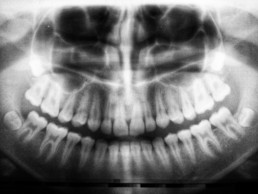
Wisdom teeth were extraordinarily useful for our cavemen ancestors. The third set of molars made it easier to manage a diet that consisted entirely of raw leaves, roots, nuts, and meats.
Of course, modern cuisine doesn’t require as much effort in terms of chewing. As people learned to cook, chop, shred, and mash with a wide variety of utensils, jaws grew smaller and wisdom teeth slowly became obsolete.
Issues Affecting Wisdom Teeth
Unfortunately, while jaws evolved to be more compact, wisdom teeth didn’t just disappear.
For most people, they still grow in between the ages of 17 and 24, though there simply isn’t any room for them in a vast majority of mouths. That means all sorts of painful problems.
They may be impacted – unable to move properly from the jaw into the mouth – or they may push through and damage the surrounding teeth. Cysts can form, causing jaw damage, and they can become infected and inflamed.
Any or all of these issues are likely to prompt your dentist to recommend having wisdom teeth removed, but even when impacted wisdom teeth aren’t causing any immediate issues, extraction is often a smart decision.
Infection, inflammation, and other damage can develop years later, but the older you are, the more you are likely to experience complications from this type of oral surgery.
What to Expect from Oral Surgery
Your dentist isn’t equipped to extract wisdom teeth, so you will be referred to an oral surgeon for the procedure.
The good news is that these expert practitioners are able to offer a variety of options to ensure you are comfortable during and after the extraction. You can talk over the pros and cons of each pain management technique to choose the method that matches your needs.
If you are experiencing a lot of anxiety, your oral surgeon may prescribe medication for you to take shortly before the procedure. The entire process takes a few hours from the time you enter the office until you are ready to leave, and you should not plan on driving yourself home.
Depending on the exact condition of your wisdom teeth, your practitioner may have to cut your gums to complete the extraction. If so, you will probably have stitches afterwards.
Often, the area is packed with gauze to soak up any fluids. Your surgeon will let you know when you can remove and discard the packing material.
Most people have a bit of pain and swelling for up to three days after wisdom teeth are extracted, so you may have a prescription for medication to relieve your discomfort.
Use ice packs to keep swelling down, and stay away from vigorous brushing, hard, crunchy foods, smoking, and drinking through a straw.
How Long Do Wisdom Teeth Stitches Last?
In most cases, your oral surgeon will use dissolvable stitches when extracting wisdom teeth. There are different types, and they can last anywhere from a week to six months.
Typically, the stitches used for oral surgery start to dissolve or fall out within the first week after your procedure, but you should consult your surgeon and your aftercare instructions for more details on your specific situation.
What Happens if Stitches Come Out of Wisdom Teeth?
The primary purpose of the stitches used during extraction of wisdom teeth is to control bleeding and support your body in clot formation. It’s usually fine if stitches start to come out sooner than expected – even the same day.
However, if you notice an excessive amount of blood, check in with your surgeon’s office to determine whether you need to be seen.
Also, if you had a particularly complex and extensive procedure, for example one that involved bone grafting, your surgeon may want you to return to the office if stitches come out of wisdom teeth too quickly.
Can Wisdom Teeth Stitches Cause Pain?
Any surgery, even oral surgery, tends to come with discomfort in the days that follow. Fortunately, the stitches themselves aren’t painful.
Your physician will suggest an over-the-counter pain reliever to ensure you stay comfortable while your mouth heals, and in some cases, he or she may prescribe a stronger medication if your procedure was particularly extensive or you are experiencing a lot of pain.
How Do I Know if I Have Dry Socket with Stitches?
Your aftercare instructions include a lot of don’ts – in particular, you must avoid drinking through a straw, eating crunchy or sharp foods, overly vigorous brushing, and smoking. Any of these activities can cause damage to the healing gums, and you may develop a condition called “dry socket”.
The “socket” is the hole left after your tooth has been removed. During the normal healing process, a clot forms in the hole to protect the underlying bone and nerves from exposure.
Sucking through a straw or allowing something sharp to come in contact with the clot can dislodge it. In addition to concerns about infection, exposed nerves can be quite painful.
Dry socket is relatively rare, and only two to five percent of people develop the condition. If you have stitches, you may not be able to tell whether the clot is intact by looking. However, if your pain is getting worse instead of better, it could be a sign of dry socket.
Be sure to consult your surgeon if you begin to experience excessive discomfort, if you notice a foul odor or taste in your mouth, or if the pain starts to radiate out towards your ear.
Is it Normal to See White after Tooth Extraction?
If you can see the area where your wisdom tooth was extracted, you should notice a dark blood clot. While unpleasant, the clot is doing the important work of protecting the wound left when the tooth was removed.
If you see white in the area, it’s a sign that the clot has been dislodged. You may be looking at the underlying bone. Be sure to consult your oral surgeon right away, so that you can prevent infection and unnecessary pain.
What if My Wisdom Teeth Stitches are Loose?
The stitches used in oral surgery aren’t intended to stay in long-term. Their primary purpose is to get the healing process started, and they aren’t usually necessary once a clot has formed in the area where the tooth was extracted.
Normally, the stitches start to dissolve or fall out within a week, and they may be loose as soon as the swelling begins to go down. There is nothing to worry about, unless you notice oozing or bleeding at the site of the extraction.
Do Wisdom Teeth Stitches Dissolve or Fall Out?
The stitches used in oral surgery are made of a special material that is intended to dissolve or fall out on its own.
While your physician will still want you to come in for a follow up visit to be sure everything is healing well, you won’t have to worry about having your stitches removed in the surgeon’s office.
The stitches may fall out, dissolve, or both, and both are normal. However, if you notice unexpected oozing or bleeding, excessive pain, or white in the socket area, you should contact your surgeon’s office to determine whether you need to go in sooner.
Having wisdom teeth removed isn’t much fun, but it is a rite of passage that most people have to go through. Fortunately, the procedure is generally quick, and so is recovery. Your oral surgeon will work hard to make sure your discomfort is minimal.
Wisdom teeth stitches are designed to dissolve or fall out on their own, so there is nothing to worry about if you notice this happening. However, it is important to keep your follow-up appointment to be sure your mouth is healing properly.
What’s Next?
About the author

